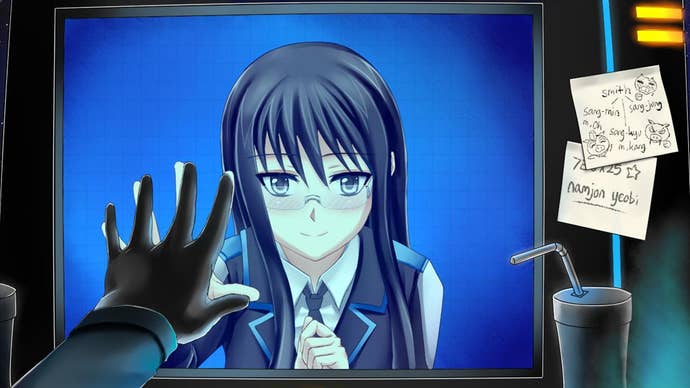Alzheimer's, Aging and What to Play When You Reach Life's End Game
Studies have shown that games can keep your brain healthy - and now Pfizer is using a game to test for Alzheimer's. But when it comes to your own parents - where do you start?
This article first appeared on USgamer, a partner publication of VG247. Some content, such as this article, has been migrated to VG247 for posterity after USgamer's closure - but it has not been edited or further vetted by the VG247 team.
The biggest myth of childhood is one few of us outgrow: the idea that our parents will never die. While most of us understand intellectually that our parents are not eternal, that their graying hair and sagging smiles are the tick-tocking of clocks winding down, it's often hard to reconcile that knowledge with the momentum of daily life. So when that realization hits, it's like acid in the blood, eating away at the illusions we use to buttress ourselves with.
"You don't remember anything at all?" I ask, worriedly.
"No," My mother replies. "Nothing."
Concern swells as I lead her into the darkened cinema hall, suddenly aware of how crinkled the small hand wrapped around the crook of my elbow is. We're talking about 47 Ronin, a film we watched a few weeks ago. It was something she had seemed to love at the time. I remember her cooing endlessly over its extravagant colors and intricate sets, the conspiratorial whispers about the costs of production. She doesn't. Instead, she only recalls the trailer and the eagerness to watch a wild-haired Rinko Kikuchi transform into a lissome Chinese dragon. Why haven't we watched that? We did, mom. We did.
"Are you sure?" I press, as we sit down, too starved for assurance to leave the subject alone. "You said you liked how the princess looked and how beautiful the landscaping w -- "
"No," She cuts me off, irritably. "I don't remember any of it."

I don't bring it up again for the rest of the day, too engrossed in a comedic parody of Chow Yun-Fat's God of Gamblers (From Vegas to Macau is excellent, by the way.) to linger on the sense of disquiet. It's not until I stumble over a TIME article about the correlation between reduced mental activity and dementia that the niggling, shivery panic returns.
"You know, you should try playing video games." I blurt out over coffee, hours after the weekly movie. "It's good for you."
My mother is bird-boned yet stern, meticulously dressed even on the simplest occasions. She looks up at me, her expression quietly critical, and I wriggle under the scrutiny. There's the tiniest of nods. Continue, the gesture says. And I do. No punches are held. I outline the irreversible, terrifying effects of Alzheimer's Disease, the horrors of regressing into a place where nothing would make sense anymore. I repeat the old adage "Use it or lose it," and we bicker over the worth of a lean body when the brain has gone to waste. Her facade cracks.
"I didn't know that." She tells me, in a small voice.
"It's not too late," I steel my smile, forcing the gnawing paranoia into the back of my head. "The movie wasn't very good. If you start working your brain now, we could totally do something about it."
We discuss buying her a 2DS. She says no, I tell her to consider it. At some point, she brings up her iPad and the stable of games I'd transferred to her months ago - games she saw as strange, loud and bewildering. Jetpack Joyride flummoxed her: why would anyone care about a number on a screen? Time is money to my mother, too precious to invest in something as frivolous as decorative items she can't touch or feel. Why bother with something that has no real-world application? For her, games are an awkward convention of youth, as separate from her demographic as wisdom as is from the adolescent. My mother's only real encounter with video games was with Christine Love's excellent Analogue: A Hate Story but even that, she only interacted with via proxy. (I translated the lines into Hokkien, she had me translate her decisions into actual action.)

"What would you recommend?"
"Uh, " I fumble. "I don't know."
More troublesome than the conversation itself, perhaps, is the epiphany of ignorance. Somehow, in spite of the fact that my entire livelihood orbits around games, I lacked the vocabulary to steer her towards the right genre, the right platform, the right title. Play is a language my mother never learned. Her earliest memories are of work, of hours spent pinioned under the sun as she harvested cherry-red coffee berries. How do you explain the appeal of Animal Crossing: New Leaf to someone already weighted in too many responsibilities? Cooking Mama? Silly when you have an actual kitchen. Cannabalt? Futility incarnate. RPGs? Confusing, complex conundrums.
"I don't know," I repeat, bewildered and a little shamed.
This isn't the first time we've discussed games. In vain, she has tried repeatedly to structure my work in a way she'd understand, to "get with the times", to see what kept me up too long and too late over the years. This is the first time, however, that games have mattered. And I didn't know where to start. At this point, it's almost a given that video games, to some extent or another, can help slow the derailment of cognitive functions. Earlier this month, pharmaceutical company Pfizer announced it will be testing the use of a mobile game for early identification of Alzheimer's. Last year, neuroscientists from the University of California demonstrated how "older people who aren't functional" can be made "cognitively younger" with training from a video game. I know, we all know, that keeping active is vital. But how do you make all knowledge into something bloody useful?
And how the hell do you slow time down?
The truth is life is a bastard committed to difficult questions and unpleasant answers. People die. Quietly, violently, shallow-breathed and flanked by kin or unexpectedly in the middle of the night- everything, even childhood myths, dies at some point. But that's no reason to surrender to nihilism. Like Santa Claus, there's something to the idea of believing your parents will persist, of loving them and holding onto them without being railroaded into misery by the knowledge they're stamped with expiration dates. I'm going to try Sudoku first. Because my mom's the kind of mathematical genius which I always wanted to be. After that, who knows? Maybe, Hate Plus. Wish me luck.
P.S: When was the last time you called your parents?

